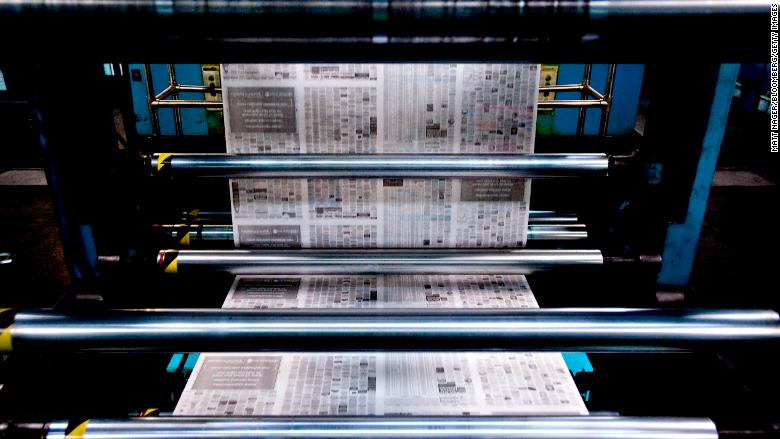
The US International Trade Commission voted Wednesday to terminate tariffs imposed on newsprint imported from Canada, a decision that was celebrated by the American newspaper industry.
In what amounts to a blow to the Department of Commerce, which upheld the tariffs earlier this month, the International Trade Commission found that the imports of Canadian paper do not hurt American producers. The commission's vote was unanimous.
The tariffs proved onerous for US newspapers already battling economic headwinds, from dwindling advertising revenues to declining readership.
The Tampa Bay Times said it cut about 50 jobs earlier this year, a decision that the paper's publisher attributed to an additional $3 million in expenses imposed by the tariffs. And last week, the LaGrange Daily News in Georgia said it will start printing five editions a week instead of six due in part to the "rapid increases in newsprint costs."
Groups representing the newspaper industry like the News Media Alliance, which represents about 2,000 newspapers in North America, lobbied against the tariffs.
"We applaud the International Trade Commission for today reaching a final, unanimous negative determination that Canadian imports of uncoated groundwood paper, which includes newsprint used by newspapers, do not cause material harm to the U.S. paper industry," David Chavern, the president and CEO of the News Media Alliance, said in a statement on Wednesday.
Although the Department of Commerce revised the tariffs to lower levels, Chavern said they still "would have been unsustainable for newspapers, other printers and publishers and printers."
Related: Local newspapers fear tariffs could cripple them
The ITC's vote on Wednesday will help address some of these concerns.
"The United States International Trade Commission today determined that a U.S. industry is not materially injured or threatened with material injury by reason of imports of uncoated groundwood paper from Canada that the U.S. Department of Commerce has determined are subsidized and sold in the United States at less than fair value." the commission said in a statement released after the vote.
The paper tariffs were advocated by Northern Pacific Paper, or Norpac, a small company in Washington that employs about 300 workers. It is owned by One Rock Capital, a private equity firm in New York.
The company said that the tariffs helped balance the playing field with subsidized Canadian companies. Craig Anneberg, the CEO of Norpac, thanked the Department of Commerce earlier this month for its decision, saying that "Canadian producers have been engaged in unfair trade practices, which harm American workers and cause material injury to our industry."
According to Anneberg, the preliminary duties imposed earlier this year allowed Norpac to restart an idled paper machine and hire 60 new employees.
David Richey, a spokesman for Norpac, said he was "surprised to say the least" by the International Trade Commission's vote. Anneberg said in a statement that the company intends to review the commission's "written determination when it is issued in a few weeks, and we will assess our options at that time."
"We are very disappointed in the USITC's negative determination, given that the record clearly shows that the domestic industry has been materially injured by dumped and subsidized imports from Canada," Anneberg said.


